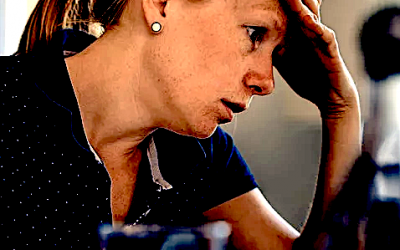Tripping in front of an audience. A painful breakup. Mumbling through a presentation. Unpleasant memories and embarrassing instances are part of life's package, yet some linger, refusing to fade into the background. Letting go, especially of traumatic memories, is no straightforward task.
Traumatic memories grip us with a vice-like intensity, seizing our very beings. They might manifest as vivid visual replays, inducing physical discomfort like headaches, profuse sweating, stomachaches, and a sense of feebleness. The aftermath of these flashbacks can bring on prolonged stress, complicating the pursuit of a brighter life.
Nonetheless, there are merits in mastering the art of releasing the shackles of traumatic events or recollecting them with diluted emotions. This applies equally to less severe discomforting recollections—like cringe-worthy middle school escapades that sporadically haunt our thoughts. This endeavor cultivates a growth mindset, facilitating forward thinking, personal evolution, and an encompassing engagement with life.
Exploring the Impact of Traumatic Memories and Strategies for Overcoming the Past
Delving into the Realm of Traumatic Memories
The American Psychological Association outlines trauma as an emotional and sometimes physical response to deeply distressing occurrences, spanning from assaults to natural disasters. Even less severe incidents like public stumbles or academic failures leave us with unpleasant feelings that reverberate when we reflect upon them.
However, a traumatic response can make it seem like we're perpetually immersed in the past, reliving the event with undiminished intensity. In cases where enduring consequences disrupt life quality, post-traumatic stress disorder (PTSD) might emerge. PTSD gives rise to physical symptoms like migraines or nausea, damages relationships, and more.
The Varying Facets of Trauma Response
Traumatic memories manifest diversely, infiltrating every facet of existence, from professional domains to personal relationships. These memories dictate choices and influence physical and emotional well-being.
Three Modes of Trauma Response.
1 Emotional Responses: Negative recollections evoke a spectrum of emotions—anger, sorrow, embarrassment, and anxiety. Violent incidents can trigger emotions and memories in unforeseen circumstances, even in the same location, rekindling past fears.
2. Cognitive Responses: True trauma has profound cognitive implications, hampering daily pursuits. Cognitive symptoms encompass forgetfulness, mental fog, and concentration lapses. Minor disruptions are also harder to handle, potentially reigniting traumatic memories.
3. Physical Responses: Trauma's grip extends to physical reactions—sweating, elevated heart rates, and even panic attacks. Severe trauma could induce physical pain tied to the event, resurfacing during recollection.
The Intricate Bond Between Emotion and Memory
Emotion and memory are deeply intertwined, etching the emotional context of moments into our minds. The amygdala, a brain structure, plays a pivotal role, regulating emotions and memory processing. Easily recalled memories often bear strong emotions—positive or negative. Reflecting on memories, even painful ones, aids emotional intelligence by spotlighting growth and potential learning.
This process helps gauge progress and boosts a positive outlook. Converting negative memories into positive perspectives fosters healthier brain function, underlining the potency of positive thinking.
Navigating Past Experiences: A Path Toward Growth
After grappling with an adverse experience, a phase of reflection typically follows. This introspection normalizes the encounter, enabling acceptance and change. When traumatic, reflection could prove agonizing, potentially dispensable. Yet, when feeling prepared, a mindful approach can be beneficial:
- Journaling: Express thoughts and feelings on paper.
- Mindfulness and Meditation: Practice to center focus.
- Physical Activity: Engage in a long walk to stimulate thought.
- Communication: Share with friends or family.
Ask Pertinent Questions During Reflection:
- Did I acquire new skills or resilience from this event?
- What helps me progress beyond this incident?
- Can I confide in a trustworthy friend or family member?
- Are there positive aspects to focus on?
Restrictions on Reflecting on the Past:
Strive for closure after acknowledging and learning from experiences. Transition to a positive stance, carrying insights forward.
Fifteen Strategies for Moving Beyond the Past
Bouncing Back from Negative Memories
Emancipating oneself from negative or traumatic memories entails multifaceted approaches. While some strategies might resonate, others require experimentation:
- Avoid Triggers: Distance from triggering environments or individuals.
- Embrace Self-Care: Weave self-care into daily routines.
- Positive Company: Spend time with uplifting individuals for a fresh perspective.
- Positive Self-Talk: Replace negativity with self-affirmations.
- Embrace Emotions: Validate emotions rather than suppressing them.
- Digital Detox: Unplug from social media to focus on the present.
- Forgiveness: Accept some may never apologize, fostering self-healing.
- Self-Forgiveness: Release past mistakes.
- Release Resentment: Free yourself by forgiving others.
- Goal Setting: Set objectives and draft action plans.
- Mindful Practice: Practice mindfulness for centering.
- Acknowledge Progress: Celebrate achievements and personal growth.
- Patience with Recovery: Recognize trauma's impact and grant yourself patience.
- Forge New Memories: Counter old memories with fresh experiences.
- Accept the Unchangeable: Acknowledge the past's immutability.
Seeking Professional Assistance
Certain memories, especially those rooted in trauma, demand professional guidance. Struggling alone when dealing with trauma is unnecessary. Robust social support fosters superior mental health, with friends, family, and colleagues contributing to well-being.
While confiding in friends can be beneficial, they may lack the expertise required. Consult a licensed mental health professional for depression, anxiety, or PTSD amplifying memories. Professionals can suggest treatments, innovative coping mechanisms, or prescribe medication.
Moving Toward Healing
Healing emotional wounds cannot be rushed. Accepting the irrevocability of past events is arduous, yet essential for growth. The healing process isn't linear; regression is normal. In this journey, patience is crucial. Regardless of scale, every triumph contributes to personal development, paving the way for a confident, wholesome life. To learn more about changing bad memories permanently there is also memory reconsolidation therapy which modifies the problem memory and reduces the emotional charge. This is also mentioned in chapter 4 of 'How to Get Over Your Ex in 5 Hours' which is all about rewriting emotionally problematic memories.
Learn the mental training strategies used by the military to clear veterans of PTSD. This is the strategy mentioned in the Washington Post that is considered the most effective and least known protocol for changing problem memories.
Get Over a Breakup and Learn to Change problem memories so you can move forward without the baggage of a past relationship.
Learn how to get over a breakup fast and change the memories of your ex, for good!


























